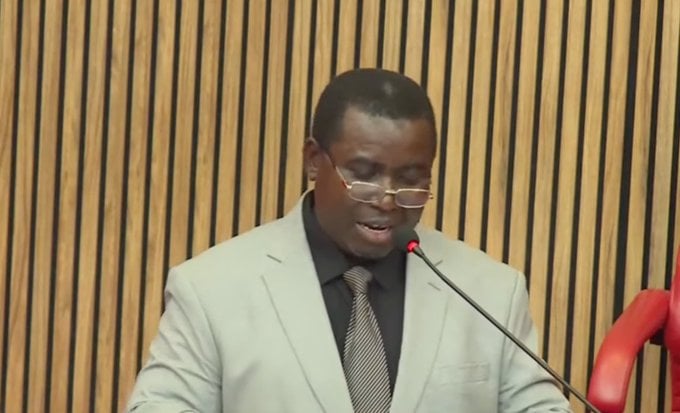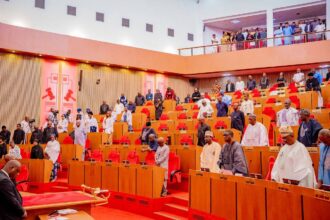
The Nigerian Senate has officially confirmed Professor Joash Amupitan, a Senior Advocate of Nigeria (SAN) and distinguished scholar from the University of Jos, as the new Chairman of the Independent National Electoral Commission (INEC). The confirmation followed an exhaustive screening session during Wednesday’s plenary at the National Assembly, Abuja, where lawmakers commended his vast experience, intellectual depth, and integrity.
Professor Amupitan’s nomination, forwarded to the Senate by President Bola Ahmed Tinubu earlier in the week, was subjected to scrutiny by the upper legislative chamber in accordance with constitutional requirements. The process culminated in a unanimous voice vote led by Senate President Godswill Akpabio, which sealed his appointment as Nigeria’s new chief electoral umpire.
Arrival and Proceedings at the Senate
The nominee, who arrived at the National Assembly complex in the company of the Kogi State Governor, Ahmed Usman Ododo, and other dignitaries, was received with a warm welcome by senators and legislative aides. Clad in a simple dark suit, Professor Amupitan exuded calm confidence as he exchanged pleasantries with lawmakers ahead of the session.
At precisely 12:50 p.m., the Senate Leader, Senator Opeyemi Bamidele (APC, Ekiti Central), moved a motion invoking Order 12 to allow visitors into the chamber. The motion was promptly seconded by the Senate Minority Leader, Senator Abba Moro (PDP, Benue South), clearing the way for Amupitan and his entourage to enter the Red Chamber.
As the nominee took his seat, Senate President Akpabio welcomed him, his family, and supporters. He lauded their presence, noting that the day marked a significant step in strengthening Nigeria’s democratic institutions. “The Independent National Electoral Commission remains one of the cornerstones of our democracy,” Akpabio said. “It is our collective responsibility to ensure that its leadership upholds integrity, transparency, and the will of the Nigerian people.”
Security Clearance and Due Diligence
Before the commencement of the screening exercise, Senator Akpabio disclosed that Professor Amupitan had undergone a rigorous background check. According to him, the nominee was cleared by the Office of the National Security Adviser (NSA), the Department of State Services (DSS), and the Nigeria Police Force.
“The nominee has been vetted and found free of any criminal record or security concerns,” Akpabio told the lawmakers. “All the relevant agencies have certified that he is fit and proper to serve in this sensitive position.”
The Screening Session
The screening exercise began at 12:55 p.m. with the Senate President outlining the procedure for the session. Professor Amupitan was then invited to introduce himself and present a brief summary of his academic background, professional career, and vision for INEC.
In his presentation, the professor emphasized his commitment to credible, transparent, and technology-driven elections. He described the electoral process as the heartbeat of democracy, stressing that the commission must inspire confidence among voters and political stakeholders alike.
“My vision is to ensure that every Nigerian vote counts,” Amupitan declared. “We must consolidate on the gains made under previous administrations while confronting the challenges of voter apathy, logistics, and electoral violence.”
He promised to enhance INEC’s institutional independence, strengthen its internal mechanisms, and deepen collaboration with security agencies, civil society, and the media.
Responding to questions from senators, Amupitan spoke extensively about the role of technology in modern elections, highlighting the successes and lessons of the 2023 general elections. He pledged to review and expand the use of the Bimodal Voter Accreditation System (BVAS) and other digital tools to ensure greater transparency.
He also stressed the need for voter education, civic engagement, and administrative reforms. “Elections are not won or lost on election day,” he said. “They are determined by the credibility of the entire process — from voter registration to result collation.”
Senators Commend His Vision and Integrity
Throughout the session, several senators commended Professor Amupitan’s responses and intellectual clarity. Senator Orji Uzor Kalu (APC, Abia North) described him as “a man of deep legal insight and proven integrity,” while Senator Enyinnaya Abaribe (APGA, Abia South) said the nominee “possesses the academic rigor and moral fortitude to safeguard our electoral integrity.”
Senator Natasha Akpoti-Uduaghan (PDP, Kogi Central) urged the incoming INEC chairman to prioritize transparency in the collation and transmission of results, especially in rural communities where electoral logistics remain a challenge. “The credibility of our elections depends on accessibility and fairness,” she stated.
Senator Opeyemi Bamidele also noted that Professor Amupitan’s vast experience in law and governance would serve as an asset in interpreting the constitutional complexities surrounding elections.
Confirmation by Voice Vote
After the exhaustive question-and-answer session, Senate President Akpabio called for a voice vote on the confirmation. The response was an overwhelming “Aye” from the senators present, with no dissenting voice recorded.
Akpabio then officially announced, “Professor Joash Amupitan, having satisfied all conditions and received the confidence of this distinguished chamber, is hereby confirmed as the Chairman of the Independent National Electoral Commission.”
The chamber erupted in applause as the newly confirmed INEC Chairman bowed in appreciation.
Background and Credentials
Professor Joash Amupitan is a distinguished scholar of constitutional and international law and a Senior Advocate of Nigeria. He has served as Dean of the Faculty of Law at the University of Jos and has published extensively in reputable journals on governance, human rights, and legal reforms.
A respected academic and administrator, Amupitan is known for his principled stance on the rule of law and institutional independence. His appointment is widely regarded as a deliberate move by President Tinubu to restore public confidence in the electoral process and reinforce the credibility of the commission ahead of the 2027 general elections.
Mandate and Future Tasks
With his confirmation, Professor Amupitan assumes the enormous responsibility of overseeing INEC’s operations nationwide. His immediate tasks include supervising the upcoming off-cycle governorship elections, reviewing electoral guidelines, and implementing administrative reforms to strengthen INEC’s operational efficiency.
Observers note that Amupitan’s tenure will be crucial in addressing long-standing issues such as election logistics, result transmission, voter education, and staff integrity. Analysts also expect him to build stronger partnerships with security agencies, political parties, and civil society organizations to promote peaceful and credible elections.
National Reactions
Reactions have begun to trail his confirmation, with stakeholders expressing optimism about his capacity to deliver. Civil society groups such as the Centre for Democratic Accountability (CDA) and the Transition Monitoring Group (TMG) described his appointment as “a step in the right direction.”
“Professor Amupitan brings intellectual credibility and a reputation for integrity,” the CDA said in a statement. “We hope he will build on the achievements of his predecessors while correcting the lapses that undermined public trust.”
Political commentators, however, urged him to remain non-partisan and assert the independence of the commission in all future elections.
With his confirmation, Professor Joash Amupitan becomes the new face of Nigeria’s electoral system at a time when the nation seeks to deepen its democracy through fairness, transparency, and public trust. As he prepares to take over from outgoing chairman Prof. Mahmood Yakubu, expectations are high that his tenure will usher in a new era of institutional reform, electoral credibility, and democratic renewal.
Word count: 1,012






